 Petzlover
Petzlover Colorpoint Shorthair is originated from United Kingdom but Oriental Bicolour is originated from United States. Both Colorpoint Shorthair and Oriental Bicolour are having almost same weight. Both Colorpoint Shorthair and Oriental Bicolour has almost same life span. Both Colorpoint Shorthair and Oriental Bicolour has same litter size. Both Colorpoint Shorthair and Oriental Bicolour requires Low Maintenance.
Colorpoint Shorthair is originated from United Kingdom but Oriental Bicolour is originated from United States. Both Colorpoint Shorthair and Oriental Bicolour are having almost same weight. Both Colorpoint Shorthair and Oriental Bicolour has almost same life span. Both Colorpoint Shorthair and Oriental Bicolour has same litter size. Both Colorpoint Shorthair and Oriental Bicolour requires Low Maintenance.
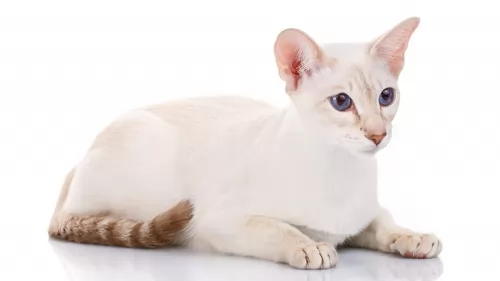 The Colorpoint Shorthair is a Siamese cat that came about when the Siamese cat was used with the red American Shorthair to bring about new colors.
The Colorpoint Shorthair is a Siamese cat that came about when the Siamese cat was used with the red American Shorthair to bring about new colors.
The actual name is given by the CFA or Cat Fanciers’ Association to refer to pointed cats that have Siamese parents and that have many colors other than the usual 4 Siamese colors which are blue, lilac, seal, and chocolate.
It was in the 1940s and 1950s that cat breeders in the UK and the USA wanted to develop a Siamese cat with red points as opposed to the traditional Siamese colors. It was in 1964 that these red and cream Colorpoint Shorthairs were awarded championship status with the Cat Fanciers’ Association.
Today, different cat registries recognize the Colorpoint Shorthair as a separate breed while others see it as a variation of the Siamese.
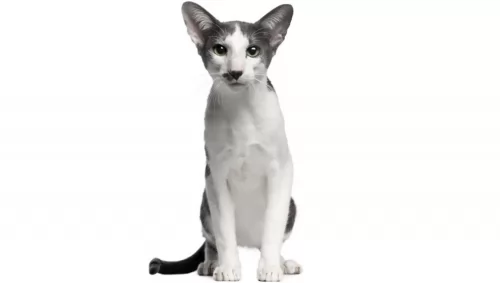 Oriental Bicolour cats owe their origins to Lindajean Grillo of Ciara Cattery. The cats hail from the United States. It was in 1979 that Grillo paired a Siamese and bicolored American Shorthair, selecting the best bicolored offspring to mate again with Siamese or Orientals.
Oriental Bicolour cats owe their origins to Lindajean Grillo of Ciara Cattery. The cats hail from the United States. It was in 1979 that Grillo paired a Siamese and bicolored American Shorthair, selecting the best bicolored offspring to mate again with Siamese or Orientals.
This particular variety was granted recognition in 1983 by TICA. It was during the 1980s that European breeders started their own Oriental bicolor breeding lines. The first modern Oriental Bicolours were imported to the UK during 2004.
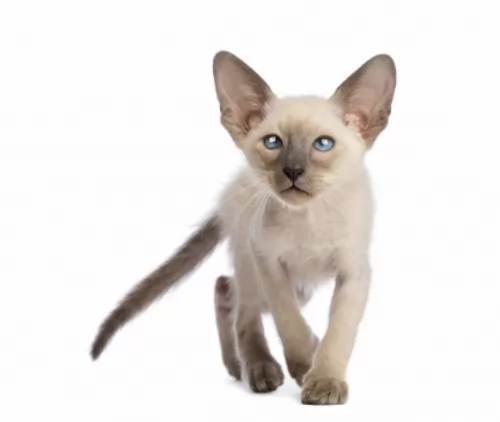 The Colorpoint Shorthair is a medium-size cat that typically weighs between 2 to 4kg and is nicely muscled. This is a long cat with legs that are long and slender too.
The Colorpoint Shorthair is a medium-size cat that typically weighs between 2 to 4kg and is nicely muscled. This is a long cat with legs that are long and slender too.
The coat is short and glossy, light-colored with darker extremities. Colors can be Cream Point, Red Point, Cinnamon Point, Seal Point, Blue-, Lilic- and Chocolate Point among others. The cat is well known for its mesmerizing almond-shaped blue eyes.
This sweet agile, athletic cat will be a delight in your home as he is highly intelligent and can easily learn a few basic commands but he is also friendly, playful, and loving. They’re social, outgoing cats too and when he’s not amusing himself, he will happily come and lounge about close to where his beloved human companions are.
On the other side of the coin, these cats can also be somewhat nervous and sensitive and they won’t adapt easily to a change in environment and lifestyle. It is why you have to choose your pet carefully and understand that owning a pet is a commitment of some 15 years or so.
Like the Siamese cat, these felines can be very vocal and they let you know when they want your attention.
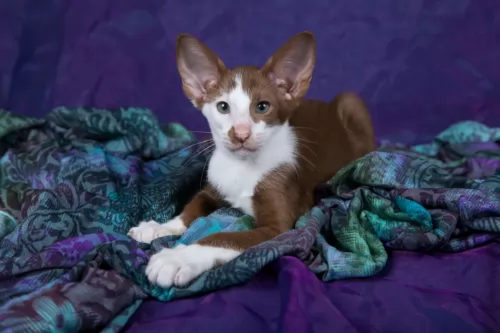 These cats with a triangular-shaped head and slender, long body have a fairly thin tail. The ears are widely set and are large. The eyes are green, but blue with the colorpoint varieties.
These cats with a triangular-shaped head and slender, long body have a fairly thin tail. The ears are widely set and are large. The eyes are green, but blue with the colorpoint varieties.
The coat is short, close-lying and sleek while the coat of the long-haired variety is fine and silky with no thick undercoat. The tail forms a plume. The coat is mostly white and the other part of the coat can be in any other color. You’ll always see quite a bit of white around the legs.
These cats are suited for singles, couples, families, and seniors - in fact, anyone still active enough to provide this cat with lots of attention.
These vibrant cats are known for their social, friendly and loving personality. They are intelligent, inquisitive, active cats that need to have plenty of interaction with their human family members. They love their human family and love to hold conversations with them.
They're entertaining too, and love nothing more to ve the center of attention. They're so into their human family that you may even have him waiting patiently for you to come home fro work. He shouldn't be left alone for hours on end and should rather have a pet friend to keep him company during the day.
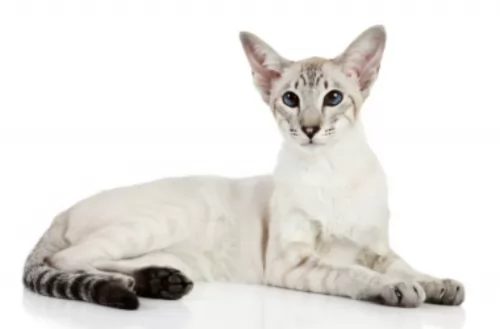 Choose the wonderful Colorpoint if you want a cat that isn’t cold and independent. With this cat you have one that is more like a companion and looks forward to being around you.
Choose the wonderful Colorpoint if you want a cat that isn’t cold and independent. With this cat you have one that is more like a companion and looks forward to being around you.
This is a loyal and loving cat who wants to be part of the human family and he wants to be involved in your life.
He suits first-time cat owners, those with children and pets in the home as well as being an excellent pet for seniors – anyone in fact, who is willing to bestow on him the love and affection he craves.
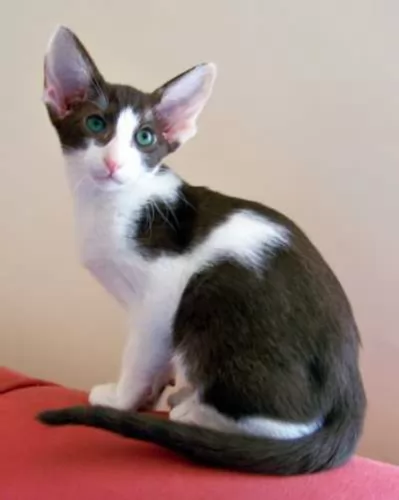 The Oriental Bicolor is such a wonderful pet to have. They are intelligent, entertaining, loving, active, playful, and inquisitive.
The Oriental Bicolor is such a wonderful pet to have. They are intelligent, entertaining, loving, active, playful, and inquisitive.
They’re also athletic and energetic. These cats have got all the characteristics you want in a good friend. They make a fantastic companion to people who are active and happy. They’re also very vocal and have a lot to say to their human family.
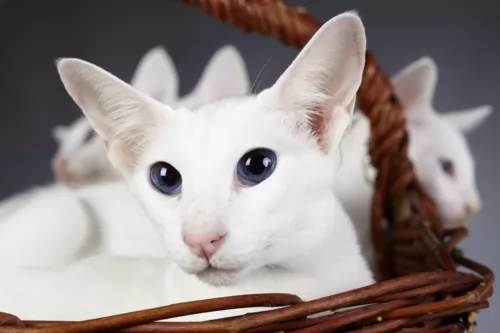 When it comes to the health of these beautiful cats, you may well find similar health issues as what affects the Siamese, some of which are asthma or bronchial disease, congenital heart defects and lymphoma among others.
When it comes to the health of these beautiful cats, you may well find similar health issues as what affects the Siamese, some of which are asthma or bronchial disease, congenital heart defects and lymphoma among others.
Lymphoma is cancer in the lymphocyte cells. Your cat will be lethargic and you will need to get him to the vet and provide the vet with a medical history of your cat. Lymphoma is believed to be associated with exposure to feline leukemia virus as well as the feline immunodeficiency virus.
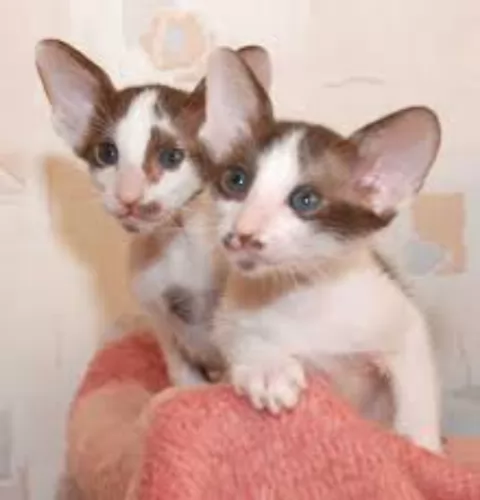 Any cat can develop health problems. Even kittens that come with a certificate of health can develop illnesses that you never thought possible.
Any cat can develop health problems. Even kittens that come with a certificate of health can develop illnesses that you never thought possible.
Orientals are generally healthy cats, but the health issues that may affect the Oriental are similar to that of the Siamese cat.
One of these is Progressive Retinal Atrophy (PRA). This is a genetic eye problem that can lead to blindness. Another disease to look out for is Asthma. The Siamese is susceptible to this disease which means your Oriental Bicolor will also be. You will have to get your furry friend to the vet who may precribe anti-inflammatory drugs.
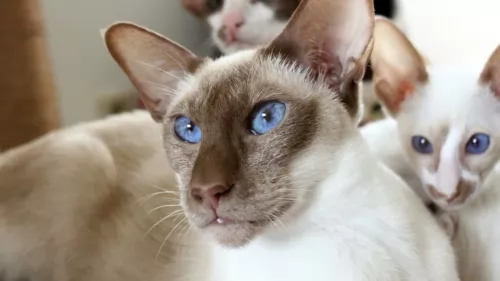 Rember that your Colorpoint Shorthair is a long, lean, musculac cat and for health purposes, you want to ensure a good diet of the best cat food there is. There are some excellent commercially manufactured cat goods available and it is wise to get to know the ingredients as meat and protein is high on the list. Cats are carnivoes and it is imperative to feed your cat high quality protein. When in any kind of doubt, speak to your vet about the best cat food available for your special feline friend.
Rember that your Colorpoint Shorthair is a long, lean, musculac cat and for health purposes, you want to ensure a good diet of the best cat food there is. There are some excellent commercially manufactured cat goods available and it is wise to get to know the ingredients as meat and protein is high on the list. Cats are carnivoes and it is imperative to feed your cat high quality protein. When in any kind of doubt, speak to your vet about the best cat food available for your special feline friend.
The short coat requires brushing once a week.
Check your cat over for any unusual lumps. Look at his eyes, check inside his ears for signs of redness and infection and check inside his mouth for signs of bad teeth as this can cause him terrible pain.
Provide a litter box and keep it scrupulously clean.
Have your cat spayed or neutered to avoid unwanted kittens and to also promote better health for your cat.
Provide your cat with a warm bed, food and water bowls, and stimulating toys.
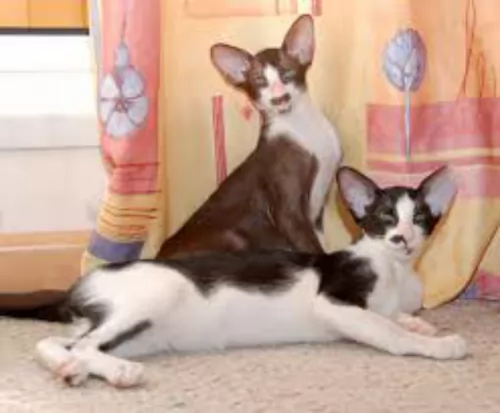 The Oriental Bicolor will require a brushing once a week. A good idea is to also take a warm, damp cloth and to wipe your cat down. It’s an excellent way to rid your cat of loose hairs as well as dust. The cat has a sparse coat, so brush him gently.
The Oriental Bicolor will require a brushing once a week. A good idea is to also take a warm, damp cloth and to wipe your cat down. It’s an excellent way to rid your cat of loose hairs as well as dust. The cat has a sparse coat, so brush him gently.
Other grooming requires nail clipping and checking inside his ears. If you clean his ears, be careful not to go deep into the ear. It is precisely why so many cat owners take their cat to the pet groomers where they can do these things professionally.
It’s very important to keep your Bicolor’s litter box spotlessly clean because like most cats, they won’t use their litterbox if it’s still got yesterday’s feces in it. It needs to be cleaned every day.
The Oriental’s diet is much like that of other cats – it has to be meaty. You can’t afford to not understand your feline pet’s dietary needs. Cats are carnivorous and they need commercial cat food that will be equal to fresh meat that they would normally find in the wild.
They need foods high in protein but they will still need some carbohydrates, amino acids, and vitamins, and minerals. Always go for the best quality pet cat foods because by buying the poorer quality ones you put your cat at risk of developing health problems. Never ever leave your cat without a constant supply of fresh, cool drinking water.
Supply your cat with all the things that make it a pleasure to have a cat. You don’t want to bring your pet home and only then start looking for things to make him at home. He’ll need food and water bowls, a nice warm, soft bed, a litter box, grooming accessories, collar, toys climbing tree and scratching pole.
Have your pet neutered or spayed to prevent unwanted kittens.
Make sure he is taken to the vet when ill. You shouldn't own a pet if you can't afford to pay vet fees. There are some cat illnesses that can make your cat very sick and uncomfortable. He should have his vaccines and also be treated for parasites.